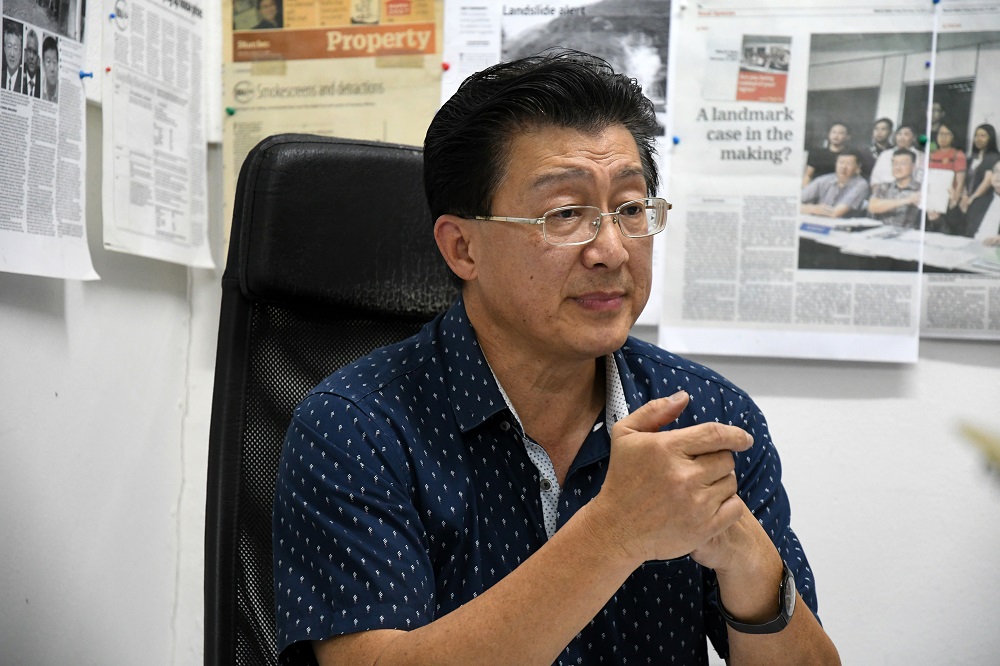
What is being sold to the public through the Private Lease Scheme (PLS)? It’s merely a long tenancy (lease) but with the entire “rent” paid upfront. Beware that there is no proprietary rights on such leases.
Property investments are commonly known to yield capital appreciations over the long term, and indeed, every house buyer hangs such a hope when they part with their hard-earned money on one such deal.
However, when it comes to signing the sale and purchase agreement for the actual property, most house buyers only check their personal details, the address of the property and the purchase price and then proceed to arrange for a bank loan to finance the purchase.
Most buyers are so trusting that they fail to recognise that they may be taking on a long lease that disguises itself as a conventional property purchase. The former is a new scheme known as Private Lease Scheme (PLS), a threat that can rob the land titles from aspiring homeowners of the current and future generations.
What is PLS?
The previous government was looking to introduce a new chapter into the National Land Code (NLC) and Strata Titles Act to allow landowners (individuals and public/private corporations) to lease out their freehold land for development for a term of 30- 99 years under a Certificate of Private Lease (Sijil Pajakan Persendirian). This PLS will allow the developer to build and construct properties like condominiums on the land for sale to the public. The pertinent question is, what is being sold to the public?
Renting disguised as buying
Buyers of PLS properties must be made aware that they are not buying the said properties but merely renting or leasing them from the seller for a specific number of years. At the end of the lease period, the future descendants of the buyers or lessees must surrender the said properties to the seller or lessor.
Hence, in this article, the terms “buyer” shall also mean “lessee” and the term “seller” shall also refer to “lessor”.
Worthless in the long run
It is common knowledge that because land is a scarce resource, property prices will appreciate in value in the long run. This applies to both freehold properties and traditional state leasehold properties. However, the latter are normally cheaper than the former due to the costs involved in leasehold renewal.
However, under PLS, the market value of the said properties will depreciate in the long run as they have to be surrendered back to the lessor on expiry of the lease period. As the lease period approaches its maturity, the market value of the PLS property will become “zero”.
Imagine paying, say RM600,000 for a property, and when your son takes over the property, it has fallen by 50%, and when your grandchildren takes over, it drops to below 25% of the original purchase price, and eventually falling to “zero”.
So what is the difference between the new PLS scheme and the traditional leasehold familiar to Malaysians?
As the name suggests, PLS is a private sector creation that is essentially a contract between seller/lessor and buyer/lessee with no guarantee of lease renewal or extension at the end of the lease period. Traditional leasehold properties are governed under the NLC, whereby there is an option either to renew or extend the lease at the end of the lease period. Therefore, the leaseholder under the NLC could stay on the property with favourable extension/renewal premiums such as what happened in PJ Old Town about 10 years ago. In contrast, the PLS buyer could possibly end up with nothing at the end of the lease period
Controversial issue in England
An example on how PLS can be detrimental to the interest of house buyers can be found in England where Malaysia has close historical connection with. In England, it is common to purchase leasehold properties from private developers that own the freehold title of the land.
The leases sold are usually long terms – often 90-plus years, similar to the proposed PLS in Malaysia except that hitherto, the trend in Malaysia is to have the entire lease consideration paid upfront at the beginning of the lease; while in England, in addition to paying the lease consideration upfront, the buyers are also required to pay ground rent on an annual basis and other payments on periodical basis for purposes of upkeep of the communal areas and for upgrading of the properties. However, we foresee that in Malaysia, the lessor will possibly impose certain additional payments on the lessee to ensure that the property can be handed over in good working condition at the end of the lease period.

Notably, in England, the controversy surrounding the leasehold system has gathered such a huge momentum in recent years that it has prompted the government there to promise to outlaw sale of such a scheme in newly-built houses.
So what are the drawbacks that would prompt the authorities in England to clamp down on such PLS schemes? After all, England is a fully developed country where market forces rule the day and government intervention is rare.
A report entitled “Leasehold: A Life Sentence?” published two years ago by the National Association of Estate Agents (NAEA) of UK discussed the problematic private leasehold scheme in England. Amongst others, buyers generally lack understanding between buying a freehold and leasehold, exacerbated by the fact that the majority of the buyers simply choose to be advised by developers’ recommended solicitors on the details of the contracts.
The NAEA report highlighted some issues, which we foresee would happen in Malaysia if PLS were allowed:
62% of leasehold homeowners feel like they were mis-sold
Most of the aforementioned buyers in England do not engage the services of other professionals such estate agents or their own lawyers when buying directly from developers. The situation is also true in Malaysia. Hence, buyers rely fully on the developers for information on the properties.
Developers will use indirect terms when marketing PLS properties, i.e. the lease period of 99 years is “as good as freehold” or is “virtually freehold”. However, when marketing such properties, crucial information is often omitted, such as the requirement to vacate the property at lease expiry without any compensation or the requirement to make annual maintenance payments to the lessors.
65% used the developer’s recommended solicitor
Most, if not all buyers who purchase directly from developers (whether in England or in Malaysia) will use developer-appointed lawyers. What is important to note is, the lawyer is acting for the developer and not the buyer and thus the developer is not obliged to inform house buyers of the pitfalls of buying a PLS properties.
57% of leasehold house owners didn’t understand what being a leaseholder meant until they had already purchased the property
Due to the fact that developers mis-sold PLS properties and that most buyers also used the developer’s lawyers, the buyers in England did not fully understand what private leasehold properties meant until they had already bought the said properties. This is also expected to happen in Malaysia as almost all buyers here use developers’ lawyers.
48% of leasehold homeowners were unaware of the escalating ground rent
In the example in England, the house buyers were only vaguely informed about the need to pay annual maintenance charges and were subsequently surprised to discover that these charges can increase exponentially over the lease period. However, by then, it would be very difficult to challenge the validity of such maintenance charges and most buyers have no choice but to pay. We foresee that developers will also impose such additional maintenance charges if the PLS is allowed as such payments represent a “perpetual cash cow” to the developers.
Difficult to re-sell
While it might be easy to buy PLS properties directly from developers, re-selling them in the future might not be so easy. Typically, banks with many business dealings with developers would normally be willing to provide 90% end-financing to the first batch of buyers who buy directly from the developers. Moreover, during this stage, the maturities of the lease periods are in the remote future at 99 years.
However, over time, as the maturity periods approach, the re-selling of such PLS properties will become harder, as most banks will hesitate to provide full end-financing. To illustrate, Albert buys a PLS property and he has a two-year-old son. At the time of purchase, the balance lease period is 95 years. When Albert’s son turns 37, he wants to sell this property to upgrade to a better property. The remaining term on the PLS property will be 60 years by then.
In assessing whether to provide end-financing, banks must consider the worst case scenario if the borrowers default and the banks have to auction the collateral properties. Due to the low demand of such PLS properties, the banks would probably only be willing to provide 50% margin of financing, which would considerably burden the next buyers who must fork out 50% down payment. Imagine the fate of Albert’s son who might never be able to sell this inherited PLS property as the value would have dropped to “zero”.
Call for government intervention
Property developers often advocate that the property market should be driven solely by market forces and that government intervention is bad. However, market forces as a market shaper is only applicable when there is a level playing field between consumers and sellers and consumers can easily switch to other sellers.
However, when it comes to property and land transactions, a level playing field does not exist. Land is a scarce resource and property developers are multi-million ringgit corporations with deep pockets. If the government were to allow PLS, many property developers, regardless housing or commercial, will jump onto this bandwagon which offers one-sided high benefits to developers/proprietors as landowners. Eventually, all projects will be under PLS and future generations of house buyers, instead of becoming homeowners with land titles, will be reduced to mere renters in perpetuity. The entire landscape of sale of property will change to “take on lease”.
The government must immediately stop this tyrannous PLS from taking root to protect the interest of all house buyers and the rakyat.
Datuk Chang Kim Loong is the Hon. Secretary-General of the National House Buyers Association (HBA).
HBA can be contacted at: Email: [email protected]
Website: www.hba.org.my
Tel: +6012 334 5676
This story first appeared in the EdgeProp.my e-Pub on Dec 4, 2020. You can access back issues here.
Get the latest news @ www.EdgeProp.my





